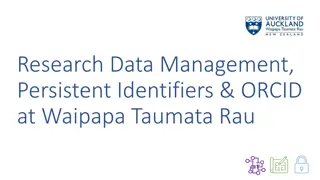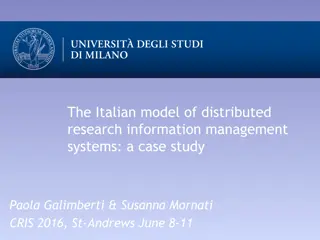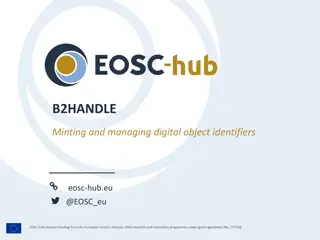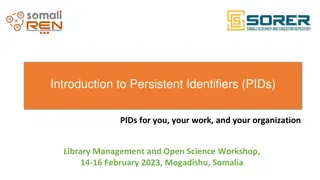Evaluation Activities at PIDS: Types, Completed, Ongoing, Proposed
A comprehensive overview of evaluation activities at the Philippine Institute for Development Studies (PIDS), including completed evaluations such as TESDA scholarship programs, ongoing evaluations like Sustainable Livelihood Program, and proposed evaluations for the coming years. The content covers
0 views • 13 slides
Framework for Research Data Management and Persistent Identifiers at Waipapa Taumata Rau
This research delves into the integrated framework for Research Data Management (RDM) and the initiatives around Persistent Identifiers (PIDs) and ORCID implementation at Waipapa Taumata Rau. It explores the background, aims, and priorities of the RDM Programme for 2022-2024, focusing on improving R
0 views • 9 slides
Italian Model of Distributed Research Information Management Systems
The case study discusses the adoption of Dspace-CRIS in Italy, highlighting the benefits such as open repositories, enhanced metadata quality, and increased national research visibility. The integration of persistent identifiers like ORCID has improved data quality and interoperability. Lessons lear
0 views • 17 slides
B2HANDLE: Managing Digital Object Identifiers for Data Persistence
B2HANDLE is a service for minting and managing persistent identifiers (PIDs) to facilitate common operations on digital objects across infrastructures. The system enables automated management of data objects and metadata, facilitates machine-driven workflows, and supports the construction of PID and
0 views • 17 slides
Understanding Persistent Identifiers (PIDs) and Handling Digital Objects
Explore the significance of Persistent Identifiers (PIDs) in assigning unique identifiers to digital objects, ensuring reproducibility, and facilitating reliable data management. Learn about versioning, PID binding, strategies for assigning PIDs, and the evolving role of repositories in managing dig
0 views • 6 slides
Understanding Persistent Identifiers (PIDs) in Research and Data Management
Persistent Identifiers (PIDs) play a crucial role in establishing long-lasting digital references for objects, contributors, and organizations in the realm of research and data management. This introduction delves into the significance of PIDs, focusing on their role in identifying and connecting di
0 views • 13 slides





